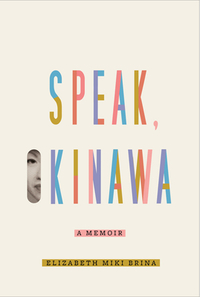Take a photo of a barcode or cover
I wanted to love Speak, Okinawa, and in some ways I did.
Elizabeth’s story holds many similarities to my mother’s (and sometimes my own) relationship with my grandmother. Both Elizabeth’s mother and my grandmother were “Japanese” war brides. Both had challenging lives in Japan/Okinawa and in the United States. My grandfather was not as caring as Elizabeth’s father (he was abusive in many ways and ended up leaving), but there were a lot of connections to my grandmother’s reliance on him for basic tasks.
My mom is very to herself and quiet about her feelings towards her mother growing up due to trauma, and although no story is the same, hearing Elizabeth’s thoughts and feelings growing up half Japanese in America helped me imagine what my own mom and grandma may have gone through. Emotionally I felt very connected to this book and felt as though Elizabeth’s story gave me the tools and clarity to empathize with my mom and grandma... something I never thought would happen as I always saw the experience as being very unique to my family.
Technically, however, the book had too many moments where I just couldn’t love it. Some of the stories were drawn out to a point that focus became difficult and the message shifted at times where I felt confused over the ultimate purpose or goal of the memoir. While some passages were incredibly powerful and emotional, others were very lengthy, dry, repetitive, and redundant which I felt took away from the impact of the novel.
Elizabeth’s story holds many similarities to my mother’s (and sometimes my own) relationship with my grandmother. Both Elizabeth’s mother and my grandmother were “Japanese” war brides. Both had challenging lives in Japan/Okinawa and in the United States. My grandfather was not as caring as Elizabeth’s father (he was abusive in many ways and ended up leaving), but there were a lot of connections to my grandmother’s reliance on him for basic tasks.
My mom is very to herself and quiet about her feelings towards her mother growing up due to trauma, and although no story is the same, hearing Elizabeth’s thoughts and feelings growing up half Japanese in America helped me imagine what my own mom and grandma may have gone through. Emotionally I felt very connected to this book and felt as though Elizabeth’s story gave me the tools and clarity to empathize with my mom and grandma... something I never thought would happen as I always saw the experience as being very unique to my family.
Technically, however, the book had too many moments where I just couldn’t love it. Some of the stories were drawn out to a point that focus became difficult and the message shifted at times where I felt confused over the ultimate purpose or goal of the memoir. While some passages were incredibly powerful and emotional, others were very lengthy, dry, repetitive, and redundant which I felt took away from the impact of the novel.
challenging
dark
emotional
informative
reflective
sad
tense
medium-paced
challenging
emotional
reflective
medium-paced
This book was pretty well written and really touched on a lot of important themes such as the way the U.S. uses foreign nations as its stomping grounds.
medium-paced
The first descriptive word that popped into my head for this book was "unfiltered," which isn't necessarily a bad thing. The hang-up, for me, comes from the fact that I approached this book expecting to get commentary and information on an Okinawan war bride's experience and not, say, so much insight into Brina's sex life/history. Does it seem like writing this book was therapeutic for the author? Yes, but, selfishly, I didn't pick it up to read about someone processing their personal life like this.
Still, though I have my thorns, there's some important conversation being made here regarding Brina's mother's situation and how Brina grew up viewing her mother as "other" and "lesser" just because she wasn't this classic picture of "American." I also appreciate learning more about Okinawa and how some of its history was presented here.
Still, though I have my thorns, there's some important conversation being made here regarding Brina's mother's situation and how Brina grew up viewing her mother as "other" and "lesser" just because she wasn't this classic picture of "American." I also appreciate learning more about Okinawa and how some of its history was presented here.
Really enjoyed this. A beautifully written story about a biracial Asian American woman learning about her mother's heritage - Okinawan. As a teenager, she expresses disdain for her mother and untangles her internalized racism. In her thirties, Brina realizes she can relate to her mother and feels guilty.
I really enjoyed the last section of the book where Elizabeth and her parents go to Okinawa to visit her
mother's family.
I really enjoyed the last section of the book where Elizabeth and her parents go to Okinawa to visit her
mother's family.
Graphic: Animal death, Child death, Genocide, Racism, Rape, Violence
Rape/SA, Attempted self-harm, murder, genocide, blood, war, PTSD, child death, Racism, alcoholism, Internalized racism, car accident
challenging
dark
emotional
reflective
sad
tense
slow-paced
dark
emotional
informative
reflective
sad
medium-paced
informative
reflective
medium-paced
Elizabeth’s mother is Okinawan, her father is American. This memoir contains Elizabeth’s, her parents’, the Okinawa people’s experiences. Elizabeth was born in America in 1981 and had, in many ways, the typical growing-up experiences as older millennials. The time + place she grew up positioned her father as the “protector” and default parent, making her mother, who spoke with an accent and living in an unfamiliar country, the “lesser” parent.
An adult Elizabeth reckons with her relationship with her mother and the cultural influences on it. The sections detailing the history and experiences of the Okinawa people are told in a collective “we”, which I found to be a brilliant way to use the memoir format to convey historical information in an evocative way. Also, a wonderful #audiobook 5 🌟
An adult Elizabeth reckons with her relationship with her mother and the cultural influences on it. The sections detailing the history and experiences of the Okinawa people are told in a collective “we”, which I found to be a brilliant way to use the memoir format to convey historical information in an evocative way. Also, a wonderful #audiobook 5 🌟
The author's writing is beautiful, and her insights into her childhood are gut-wrenching. I am simply not emotionally equipped to read this book at this time.
Moderate: Racism
Minor: Alcoholism
challenging
emotional
informative
reflective
medium-paced







